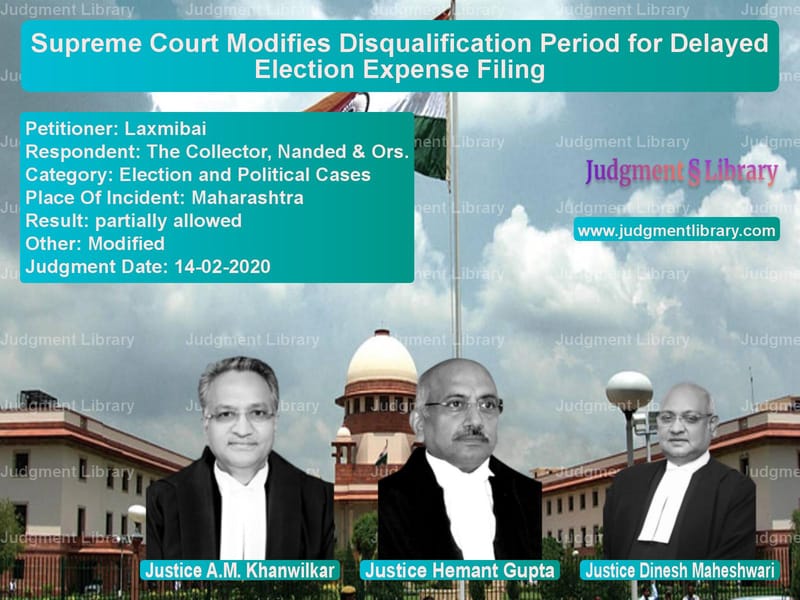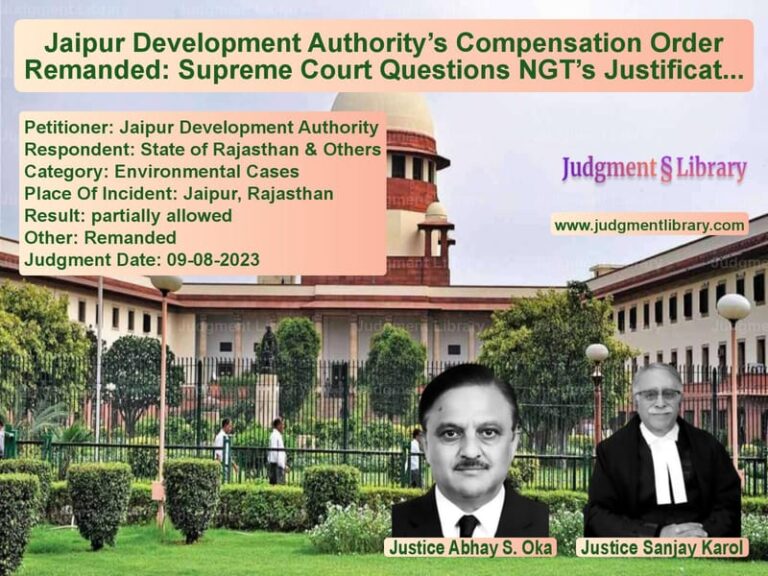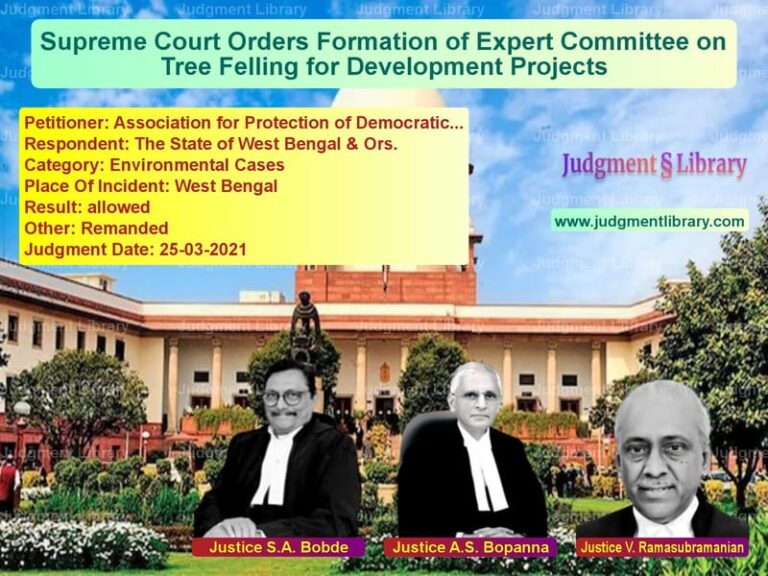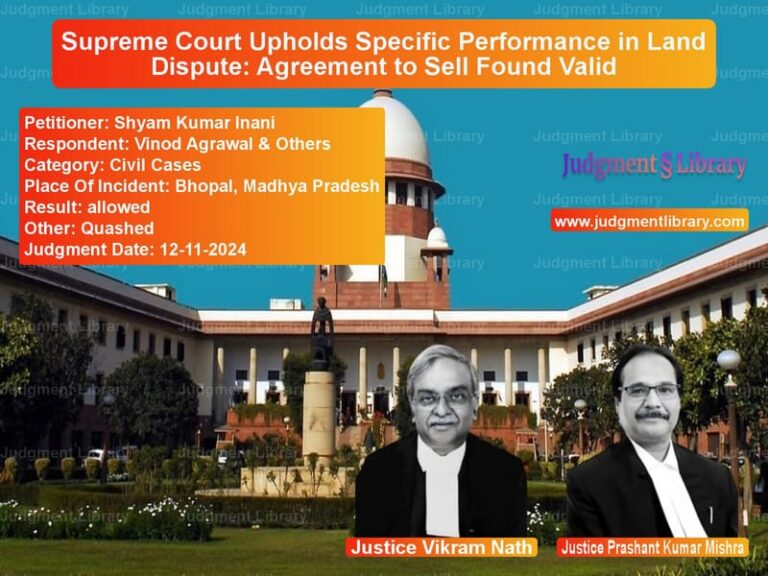Supreme Court Modifies Disqualification Period for Delayed Election Expense Filing
The case of Laxmibai vs. The Collector, Nanded & Ors. deals with the disqualification of an elected Gram Panchayat member due to a delay in submitting election expenses. The Supreme Court ruled that while disqualification is permissible, a five-year period is not mandatory and must be justified based on the nature of the default. The judgment highlights the importance of proportionality in election law and the need for authorities to consider mitigating factors before imposing severe penalties.
Background of the Case
The case originated when Laxmibai, an elected member of the Gram Panchayat, Mugat, in Maharashtra, failed to submit her election expenses within the prescribed period under Section 14B of the Maharashtra Village Panchayats Act, 1959. She submitted the details with a delay of 15 days, citing ill-health as the reason.
The Collector, acting as a delegate of the State Election Commission, disqualified Laxmibai for five years. The Additional Divisional Commissioner upheld this decision, rejecting her medical certificate as insufficient evidence. The Bombay High Court also dismissed her writ petition, leading to an appeal before the Supreme Court.
Arguments of the Petitioner (Laxmibai)
- The petitioner argued that her delay was unintentional and caused by health issues, which should have been considered as a valid excuse.
- She contended that there was no finding that the expenses she submitted, although delayed, were incorrect or in violation of any financial limits.
- She argued that a five-year disqualification was disproportionate to the nature of her default and that the law does not mandate such a long disqualification.
- She pointed out that the Collector took three years to pass the disqualification order, which severely prejudiced her, as the five-year period started only from the date of the order, affecting her ability to contest future elections.
Arguments of the Respondent (The Collector, Nanded & Ors.)
- The respondents maintained that submission of election expenses within the prescribed time is a mandatory requirement under Section 14B of the 1959 Act.
- They contended that Laxmibai failed to provide a valid justification for her delay, as her medical certificate lacked specific details such as diagnosis, date, and reference number.
- They argued that the Collector’s decision was in line with legal requirements and that disqualification was the natural consequence of non-compliance.
Supreme Court’s Judgment
A bench comprising Justice A.M. Khanwilkar, Justice Hemant Gupta, and Justice Dinesh Maheshwari modified the disqualification period, ruling that the five-year disqualification was disproportionate. The Court made the following key observations:
“The State Election Commission is to be satisfied as to whether a person has no good reason or justification for the failure to furnish account of election expenses.”
The Court emphasized that Section 14B does not make a five-year disqualification automatic:
“The disqualification for a period of five years is not a necessary consequence of merely not filing an account of election expenses. The provision empowers the Commission to reduce the period of disqualification for reasons to be recorded.”
The Court criticized the authorities for failing to consider mitigating factors:
“The extent of the default and its consequences must be evaluated before imposing the maximum penalty. Disqualification is a severe measure that impacts not just the individual but also the electorate.”
The Court also noted the delay in passing the disqualification order:
“An inordinate delay in pronouncing the disqualification order prejudices the candidate, as the period starts from the date of the order. The authorities must act expeditiously to avoid undue hardship.”
As a result, the Court set aside the five-year disqualification and remitted the case to the Collector for reconsideration of the period of disqualification based on the nature of the default.
Key Takeaways from the Judgment
- Disqualification is not automatic: The Election Commission has discretion in determining the duration of disqualification.
- Proportionality is crucial: The authorities must consider the severity of the default before imposing a penalty.
- Delays in official decisions matter: The Court recognized that delays in passing disqualification orders can unfairly extend the period of restriction.
- Judicial oversight in election law: The ruling ensures that election authorities exercise their powers fairly and reasonably.
Impact of the Judgment
This ruling has significant implications for election law and administrative decision-making:
- It prevents arbitrary and excessive use of disqualification provisions.
- It ensures that candidates are not unfairly deprived of their electoral rights due to minor procedural delays.
- It emphasizes the role of proportionality in administrative decisions.
The decision also highlights the judiciary’s role in protecting democratic processes and ensuring that elected representatives are not removed from office without adequate justification.
Conclusion
The Supreme Court’s decision in Laxmibai vs. The Collector, Nanded & Ors. reinforces the principle that disqualification for election law violations must be proportional to the nature of the default. By setting aside the five-year disqualification and remanding the case for reconsideration, the Court has ensured that election law is applied fairly and justly. This judgment serves as a guiding precedent for future cases involving election-related disqualifications.
Petitioner Name: Laxmibai.Respondent Name: The Collector, Nanded & Ors..Judgment By: Justice A.M. Khanwilkar, Justice Hemant Gupta, Justice Dinesh Maheshwari.Place Of Incident: Maharashtra.Judgment Date: 14-02-2020.
Don’t miss out on the full details! Download the complete judgment in PDF format below and gain valuable insights instantly!
Download Judgment: Laxmibai vs The Collector, Nande Supreme Court of India Judgment Dated 14-02-2020.pdf
Direct Downlaod Judgment: Direct downlaod this Judgment
See all petitions in Public Interest Litigation
See all petitions in Legislative Powers
See all petitions in Fundamental Rights
See all petitions in Judgment by A M Khanwilkar
See all petitions in Judgment by Hemant Gupta
See all petitions in Judgment by Dinesh Maheshwari
See all petitions in partially allowed
See all petitions in Modified
See all petitions in supreme court of India judgments February 2020
See all petitions in 2020 judgments
See all posts in Election and Political Cases Category
See all allowed petitions in Election and Political Cases Category
See all Dismissed petitions in Election and Political Cases Category
See all partially allowed petitions in Election and Political Cases Category







